From the numbers coming out of tournaments- and the near-universal assessment of the competitive community- taking the first turn appears to be a significant advantage. How do we solve this problem? Click to read more, or check out the Tactics Corner for reviews and strategies.
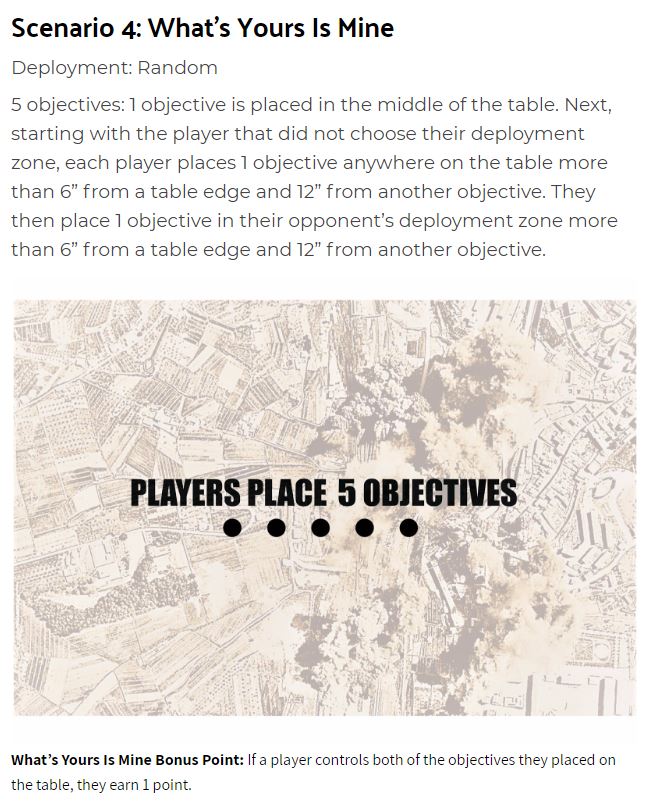
One of the first things that most players took from the new mission packs once they were released was that the first player had a significant advantage in scoring, and while there was some argument about it at the time, I don’t think that is the case anymore. Goonhammer did an excellent piece analyzing the tournament results we’ve seen so far with some very good statistical tools that I think puts the controversy entirely to bed- first turn is generally better, end of story.
Now, this in itself is not problematic; it is almost inevitably going to be the case that either first or second turn is broadly better than the other, so having there be a disparity is not itself a huge issue. However, the magnitude of the disparity, I think, is a problem- it tilts things by as much as 10% if these early readings are any indication. Now, we should take all of this with a grain of salt because the game is still new and players are adapting their lists and thinking to how to cope with these problems, but given that the disparity increases in the later rounds, rather than decreases, seems to indicate that it is not a lack of skill or knowledge that is causing this problem- when equally-skilled opponents face down against each other, the first player is favored to win.
So the question becomes what can be done to blunt this advantage? As I said earlier, the existence of the advantage itself is not the problem- it’s the magnitude of it that is an issue. So as we look at potential solutions, we should be looking at what sort of tweaks can accomplish the goal, rather than complete overhauls of the system.
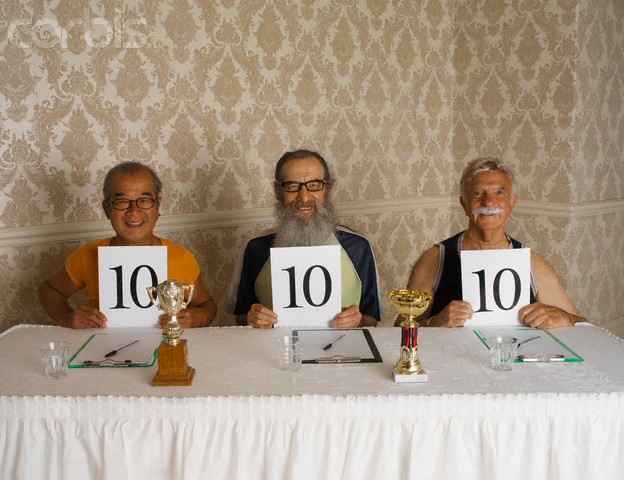
Option 1: Scoring
At its most basic level, I think the issue here is dualistic: the first player has both an advantage in firepower and an advantage in scoring, which multiplies the effects of each of them. Note that this was the opposite case in 8th edition, where going first netted you a firepower advantage but going second was an advantage in scoring. If we can dissociate those two advantages a bit, it should go a long ways in terms of bringing the first-turn powerhouse into check.
The easiest way to do this is probably to modify the secondaries. End of battle round scoring, rather than beginning of turn scoring, gives the second player a significant edge because they have the “final say” in what happens. Since the secondaries are already a mix of end-of-turn and beginning-of-turn scoring this could be relatively painless to implement, possibly even just retooling a few of the existing objectives to do it.

Option 2: Terrain
Given the new terrain book we have seen previewed already, this may be a solution Games Workshop has already created- however, I still think it is worth talking through. The goal here is to solve the other half of the aforementioned dualistic firepower-and-scoring combo, giving the second player an advantage in their damage output rather than victory points.
This might seem a bit counterintuitive at a first glance- doesn’t the first player, by definition, always have superior firepower by virtue of going first? However, this is not actually the case, because it’s who gets to use their firepower first that matters. If the second player is consistently able to hide or protect all of their units from the first player’s alpha strike the advantage actually turns to them, as the first player is essentially forced to move out from any hiding spots of their own and get onto objectives in order to be ready to score points, theoretically exposing their units to the enemy’s shooting.
Now, how one would do this beyond simply changing the recommended terrain density, I don’t really know; perhaps the expanded terrain rules include “heavier” types of cover that can add more than +1 to a unit’s saves, or give invulnerable saves, or some other type of bonus that adds significantly to unit durability. If balanced properly with weapon statlines and whatnot, this would potentially negate much of the first-turn advantage as well.
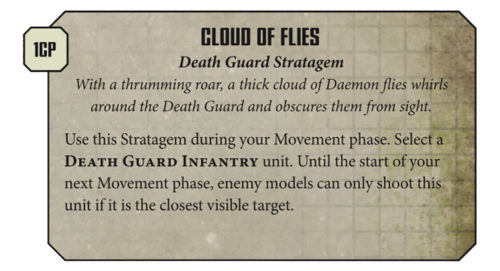
Option 3: Stratagems
This is actually a solution that we have seen implemented in the past during 8th Edition, specifically in the form of the Prepared Positions stratagem. The idea would be that one or more generic stratagems would be added to the game that provide either a defensive or scoring bonus (or both), but that can only be used by the second player. (Stratagems that can be used by either player but function more effectively for the second player would have the same overall effect.)
Prepared Positions itself was actually a pretty clever way of doing this, though of course it’s not the only way. A blanket -1 to hit, or 5+ invulnerable save, or some other bonus is an easy way to tilt the odds, and these bonuses are actually one of the more flexible ways to do so because it is possible to adjust their CP costs to try and find the desired balance point. Similarly, some sort of scoring or reserve bonus might be possible to achieve a similar effect- for example, stragagems that allow the second player to bring reserves in on the first turn of the game, give some or all of their units ObSec for a turn, allow them to score some primary or secondary objectives on the first turn of the game, etc, are all theoretically possible.
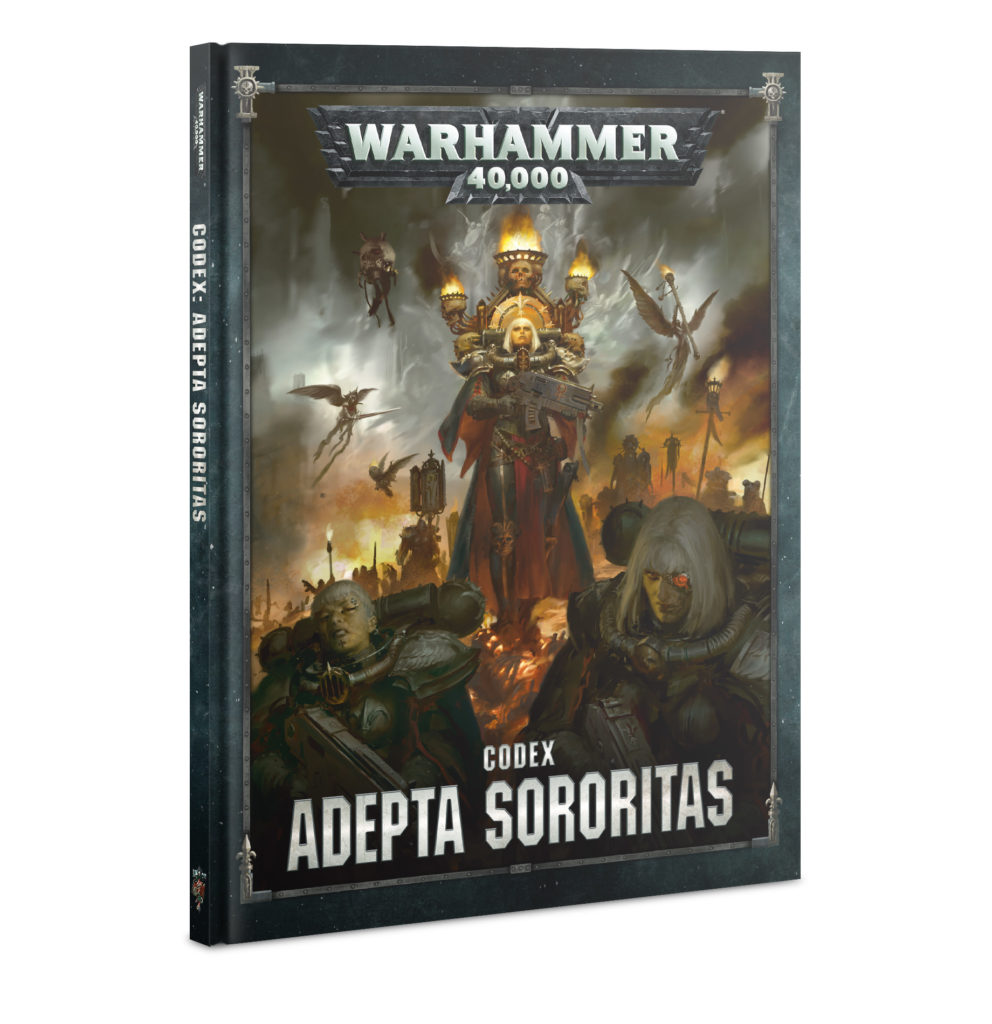
Option 4: Codex Balance
Of course, it doesn’t have to be the core rules that are rewritten to shift the first-versus-second balance, as the core rules are only a small part of the overall rules of the game. It’s entirely possible that Games Workshop could write the codices for 9th Edition such that they favored going second overall, by use of some combination of stratagems, unit rules, army-wide rules, etc.
Of course, this would probably be the hardest path to follow for a number of reasons, and the one I would least expect them to choose as a result. This would mean making sure that each codex printed was similarly-inclined to favor the second turn (as big disparities there could actually cause more problems than they solved) and also that all of the codices would be released in a sufficiently-timely manner to ensure that the problem actually gets fixed- after all, if four armies are using “new” codices that favor going second but nineteen are using “old” codices that don’t, the game hasn’t really been rebalanced, has it?
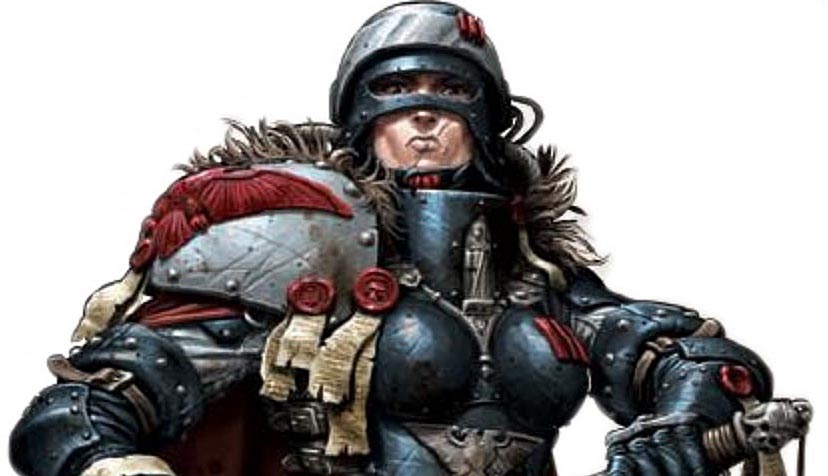
Option 5: Do Nothing
It’s easy to lose track of this in all of the talk about these sorts of things, but it’s important to remember that there is the option to simply accept the status quo and deal with it. It is not impossible that the first-turn advantage is simply an artifact of our current modes of thinking and that it will fade as players adapt to the new edition and tournament organizers work to ensure that terrain and missions similarly are set to maximize game balance.
Even if the advantage actually is real, it also isn’t so pronounced as to make the game unplayable- a 60/40 split at the outside is obviously far from ideal, but neither is it insurmountable in the face of the many other factors that come into play when two armies face off. It is well within the realm of possibility that games Workshop doesn’t see the imbalance as so problematic that it needs an immediate fix and will simply wait until next year’s Chapter Approved to update and tweak things, or perhaps won’t attempt to do so at all.
It’s important to remember that we are still very early in the edition at this point- not only do we not know what Games Workshop’s plan for various codices and other supplements is, but we haven’t had enough rigorous playtesting and tournament results to say very much with absolute certainty. The first-turn advantage very likely is real according to all the data gathered so far, but that doesn’t necessarily mean it is the defining trait of the edition or that all of our efforts need to be dedicated to circumventing it. Especially in uncertain times like these, it benefits the community (and GW) to act with care and caution, lest they make the problem worse in trying to solve it. That doesn’t mean it should be ignored or brushed off as trivial, but it does mean that open dialogue about things is important, as is taking actual data and assessment by top players into account when making decisions.
Oh, and Rob? We don’t care what you think about which tournaments “count” or what Warhammer World is doing, just to head that horse off at the pass.
As always, remember you can get your wargaming supplies at great discounts every day at the Frontline Gaming store, whether you’re looking to start a new army or expand an existing one.



Given how much Infinity has grown over the last few years, and anecdotal stories of 40K players being intrigued by the amount of terrain on the tables at Infinity events, I like to hope that GW has taken notice and is trying to push for an increase in terrain density in the game. 40K tables have always been underwhelming to me in that regard. Cities of Death (3rd Ed.) was my favorite expansion GW has put out.
Also, thanks for that bit at the end AP. Who gives a damn about Warhammer World anyway? GW is just now getting interested in the competitive scene, after years and years of neglect. FLG, Adepticon, NOVA all had to volunteer to step up and fill that void. It’s nice that GW is taking an interest again, and I hope they continue, but we’ve proved we don’t need them.
An idea I’ve been kind of theorying in my head is the second player having a stratagem that forces up to a certain power level of the first player’s units into strategic reserve, with more CP spent meaning a larger power level, and a cap on the CP that can be spent depending on the size of the game.
Would require a shift in the pregame of course, something like:
Roll off, winner chooses attacker or defender
Attacker declares strategic reserves and units that will deploy off the table
Defender uses the force into reserves strat
Defender declares strategic reserves and units that will deploy off the table
Deployment starting with the attacker
Attacker goes first
Would also need some restrictions, like it can’t be used on characters as that would just be miserable for armies that need those cheap support characters.
Probably too convoluted, but I like it thematically (attacker gets the drop on the defender but is spread out) and means the defender can remove trouble units for the first turn, but they’re not useless as coming on from strategic reserve is useful.
Anyway, that’s just my random musings.
Honestly, I really like that solution
Thanks!
If you’re reading this GW I’m open to working on commission 😛
Sooo..when i design list i just take hat into considerations, and select portion of my army that i want in reserves, and will put them in with my opponents cp? xD
Well if your opponent chooses to put the stuff in reserve that you want in reserve then they’ve not done a great job, it’s their choice 😛
Even if they choose badly it’s still off the board for the first turn, can’t use its fire power or get on objectives
Wait, you are choosing what your opponent have to put into reserve? Like for example forcing my opponent to put all drones in reserves? Or unit that they normally could infiltrate outside deployment? one way or another this leads to absurd situations.
Yes, the player going second forces the first players units into reserve. Yeah it would be powerful, but going first is currently giving a massive advantage so seems appropriate, and would incentivise players to use strategic reserves for units that need synergy so they can arrive together, but I don’t think that would be a bad thing as it spreads unit effectiveness throughout the game rather than incentivising alpha strikes. If it’s too good you could adjust the power level or CP of the stratagem.
Either way it’s all academic as GW ain’t going to listen to my ramblings (for the best really :P)
I’m leaning more into Scoring solution. Endgame primary of some sort, instead of paint points(no one plays with those). 10% of overall score is significant and might tip the scale but wont overshadow progressive primary and secondaries, so player that goes first must use his 5th turn to setup for that in a most bulletproof way he can, instead throwing away his army just to prevent second player from scoring his primary/secondary.
Alpha strike can be addressed with terrain, but this advantage in point denial can only be addressed within way of scoring.
WHAT TOURNAMENTS ?
The biggest scheduled in the UK has TWENTY players – that doesn’t generate enough data to see anything. I’m not seeing many bigger anywhere in the world.
The real tournament scene isn’t happening.
What’s changed ?
Going first has always had advantages – some missions prevented this bt scoring objectives at the end of the battle turn, not players turn.
Make sure you don’t click on the linked article or anything that has all the math in it, that would just spoil the fun.
C’mon, Rob, you gotta try harder than this. You’re making it look like you’re some sort of weird, ignorant partisan who doesn’t even read the arguments he’s trying to disprove before posting, and that ain’t a good look for anyone. If you wanna argue about the statistical relevance of or relative magnitude of these events that’s cool, but it’s hard to take you seriously when you demand to know what tournaments we’re talking about when those tournaments and data we’re talking about are listed in a multi-thousand word appendix that you skipped over in your hurry to talk about how wrong we all are.
I love a good argument but you gotta put in the effort, my dude. It seriously does scan like you just read the title.
To give an order of magnitude to Rob wrongness : 10 seconds of reading show that it’s based on 4 tournaments of at least 24 players. His claim that there is no tournament bigger than 20 is so wrong it’s ridiculous.
Well he said that no tournament outside of UK has more than 20 players. (I haven’t actually looked anywhere to see if this is true or not).
But as we all know from Rob’s frequent outbursts, anyone outside of the UK isn’t playing the game correctly. Only the UK plays it correctly cause they play exactly how GW says. Everyone else is playing the game wrong and having BADWRONGFUN. So it doesn’t matter what any data says unless they play it his way.
Reading 5 more second showed half thoses events were in the UK. It sort of surprised me it was so few given the feeling that Goonhammer is primaly UK based.
The overall point is that Rob is a big fat liar. I am not sure if anyone take him seriously, but I believe it’s a good idea to make real sure each of his posts is followed by exposing the lie, especially when they are blatant.
Spent some time thinking on this yesterday. Here’s a stratagem I would give to the 2nd player:
“Defensive Hold (1CP): You may not use this stratagem if had the first turn. Use this stratagem during the Command Phase. One unit of your choice gains Objective Secured, or else loses that ability if it already has it. You may only use this stratagem once per game.”
Alternate option if that doesn’t go far enough:
“Defensive Hold: In this mission, a player who did not have the first turn takes an extra Command Phase at the end of their final turn.”
The timing with that one could be a little bit awkward, but it seems to work. I’m not sure if it would be sufficient, though, because adding/removing ObSec to one unit on a single turn of the game doesn’t seem like enough.
I was thinking along the lines of a “use once and lasts until the next turn” thing that either granted ObSec to all infantry models in the 2nd players army, or removed ObSec from all models in the 1st player’s army. Black Legion already has a similar ability, so it seems like it wouldn’t be too game-breaking.
I wonder what happens to the goonhammer model if you just give a point handicap to the player going second?
Hmm. Doable, and is theoretically the simplest version, but I’m not sure I like the feel of it overall. Still, it might be easier to work with than some of the other options, since it has a very direct impact on the game rather than an indirect one.